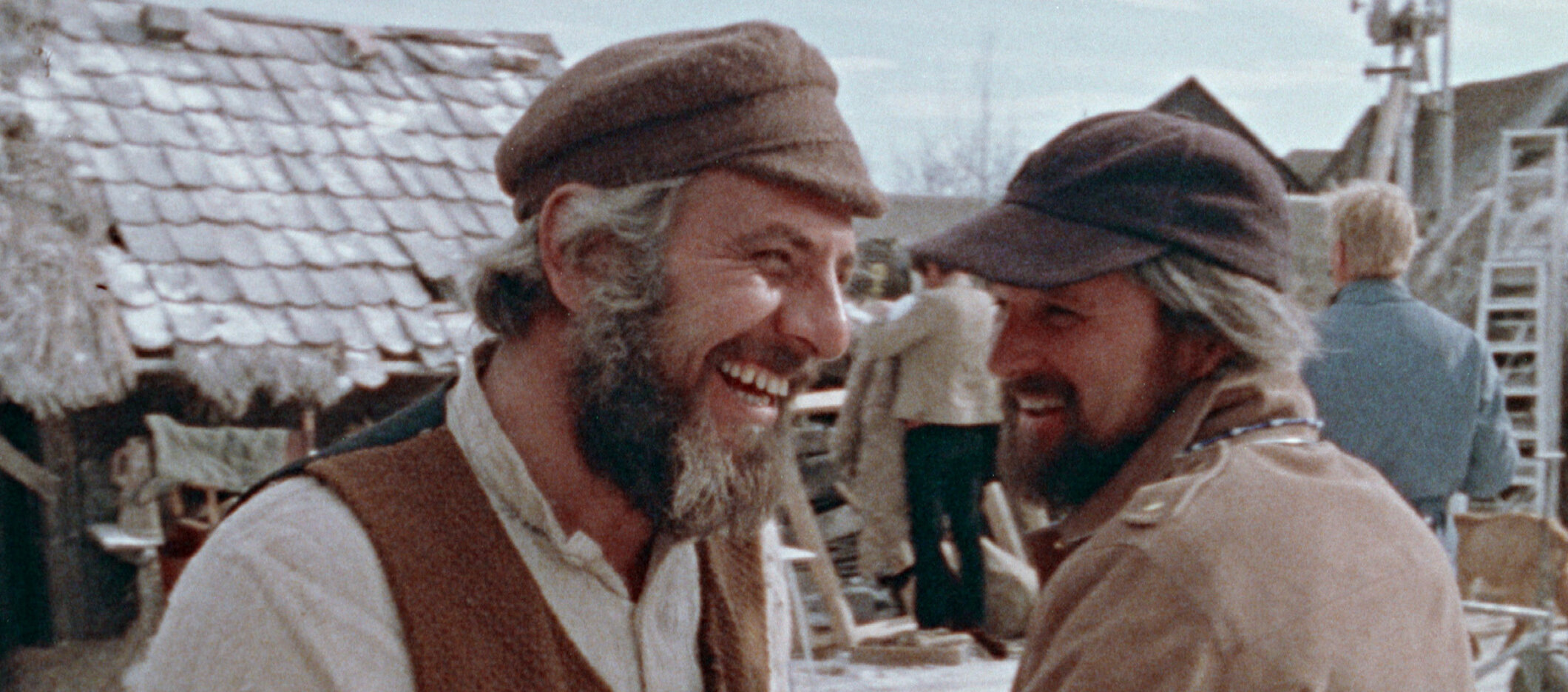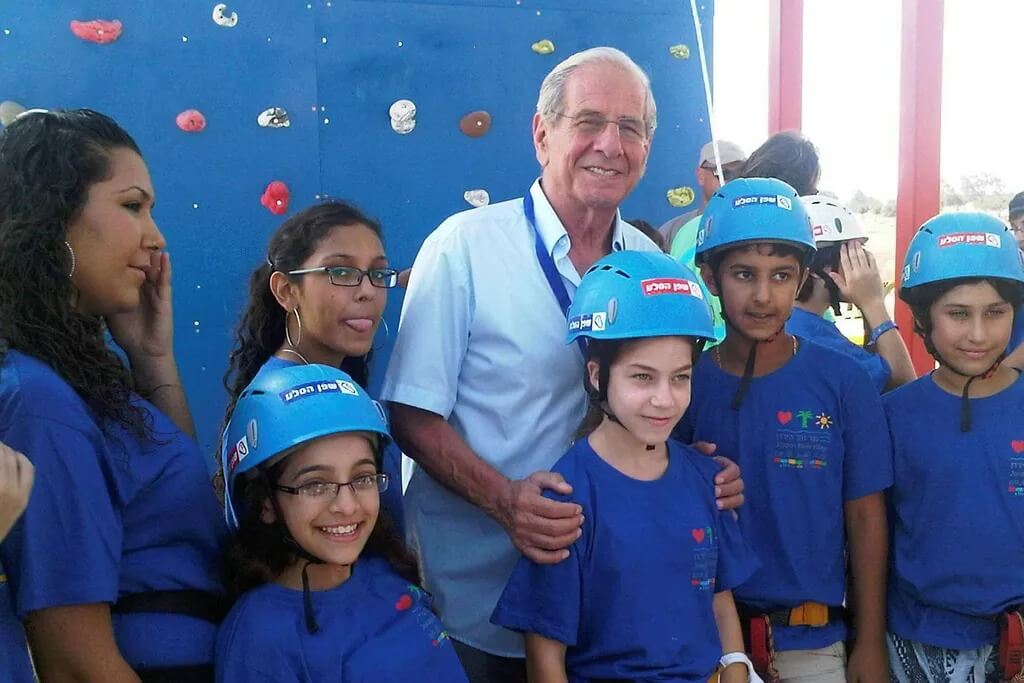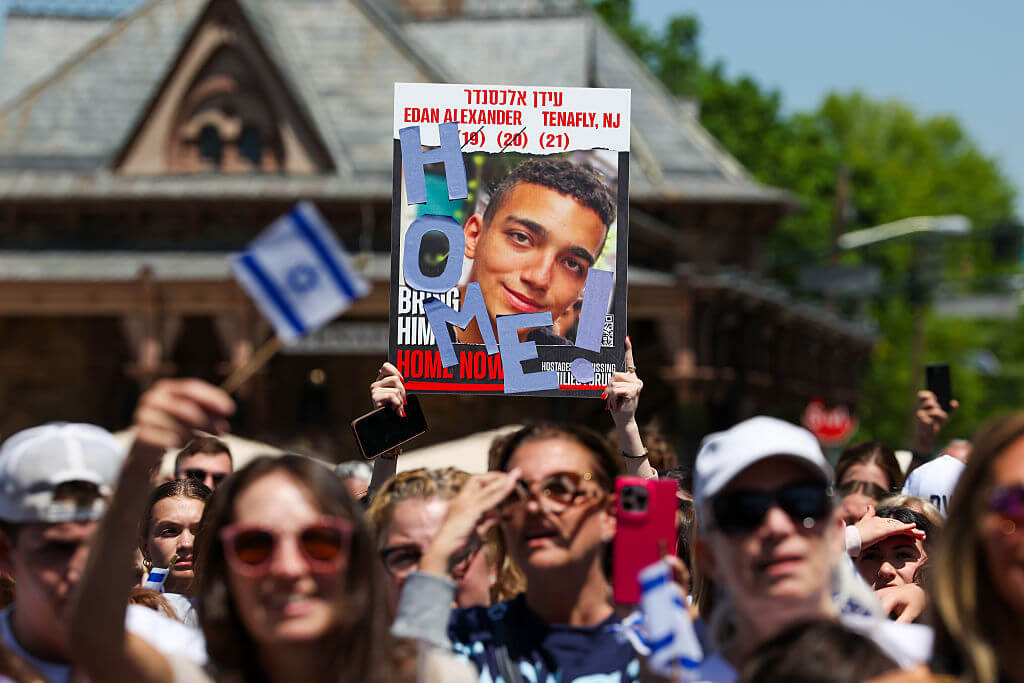Chaim Topol, known worldwide for his starring role in ‘Fiddler on the Roof,’ dies at 87
The Israeli star of stage and screen played iconic roles, such as Tevye the Dairyman and Sallah Shabati, and dedicated much of his later life to charity work

Director Norman Jewison, right, and star Topol as Tevye on the set of the film version of Fiddler on the Roof. Photo by Zeitgeist Films in association with Kino Lorber
This article originally appeared on Haaretz, and was reprinted here with permission. Sign up here to get Haaretz’s free Daily Brief newsletter delivered to your inbox.
The Israeli actor, producer and social entrepreneur Chaim Topol, best known by international audiences for his portrayal of Tevye in the film adaptation and British and American stage productions of “Fiddler on the Roof,” has died at the age of 87.
Topol was one of Israel’s leading actors, and was known – usually by his last name alone – around the world for his stage and movie performances. He won two Golden Globe awards, for the Fiddler film and for his leading role in Sallah Shabati (1964), and was nominated for a Tony Award for his performance as Tevye on Broadway. He had also been nominated for the best actor award at the Academy Awards in 1971.
Topol devoted much of his later years to charity as chairman of the board of Jordan River Village, a camp serving Middle Eastern children with life-threatening diseases. In 2015, he was awarded the Israel Prize for his life’s work and for his special contribution to Israel and its society.
Topol, who was born in 1935, was born and raised in Tel Aviv, and worked as a printer’s apprentice in his youth. He did his military service in the Nahal entertainment troupe, where he met Galia, his future wife, and Uri Zohar, who was his performance partner for many years.
While in the Nahal troupe, Topol first played the character of Sallah Shabati, a Mizrahi Jew who immigrated to Israel, in sketches written by Ephraim Kishon. These were the basis for the eponymous movie, directed by Kishon in 1964.
In 1957 he founded the Batzal Yarok (Green Onion) theatre troupe, alongside Uri Zohar, Gabi Amrani and other veterans of the Nahal troupe. Three years later, he co-founded the Haifa Municipal Theater, where he played, Petruchio in “The Taming of the Shrew” and Jean in “Rhinoceros,” among other roles. In 1962, he played the judge Azdak in “The Caucasian Chalk Circle,” alongside Zaharira Harifai, which was staged at the Venice Theater Festival to much acclaim.
Topol’s international career began in 1966, when he started to perform his best-known role, Tevye the Dairyman, in the West End musical “Fiddler on the Roof.” He played this role for years, in London and on Broadway. His renditions of the musical’s songs are still well-known, including “If I were a Rich Man.”
His first movie role came in 1961, in the Israeli film “I Like Mike,” directed by Peter Frye. Two years later, he appeared in the movie “Eldorado.” His first English-language movie role came in 1966, in “Cast a Giant Shadow,” which tells the story of Col. Mickey Marcus, played by Kirk Douglas, against the backdrop of Israel’s War of Independence. A year later, he appeared in Ephraim Kishon’s “Ervinka.”
When the U.S.-produced movie adaptation of “Fiddler on the Roof” was released in 1971, with Topol in the lead role, he garnered the Golden Globe award for best actor in a motion picture – musical or comedy. He was also an Academy Award contender as best actor in the same role, but lost to Gene Hackman for his role in “The French Connection.”
The movie catapulted him to worldwide fame, and he continued to appear in international films. Among others, he played the lead role in “Galileo” (1975), “Flash Gordon” (1980) and the James Bond movie “For Your Eyes Only” (1981). In 1985 he performed in the Israeli movie “Again, Forever,” alongside his wife Galia and daughter Anat.
Topol was also an amateur painter. He painted a series of portraits of Israel’s presidents, which appeared on stamps issued by Israel in 2013. Proceeds from the sheets of these stamps benefited the Jordan River Village, the camp that Topol helped establish.
Located in the lower Galilee, it opened in August 2011, and has hosted thousands of children with incurable and life-threatening diseases and their families. As part of his social activism, Topol also served on the board of directors of Variety Israel, which helps children and youth with special needs.

Reflecting on his life in the Associated Press, Topol said in 2015 that he works to promote coexistence at the Jordan River Village. He said of the initiative: “I can tell you that in our village, Jews and Arabs and Christians and Muslims and Jews are hugging each other, and it works very well when politicians are not involved,” he said.
“I admit that I never went from part to part like actors usually do. I have other interests, and I draw and I am interested in charities, and I find it more fulfilling than running from one part to another.”
The committee that awarded Topol with the Israel Prize wrote that he has been a pillar of Israel’s culture industry for many years. “His diverse work onstage has bestowed much honor on Israel. His actions left a mark on the foundations and infrastructure of Israel’s stages, leading to the development of Israeli theater. His influence is visible to this day in Israel’s evocation, music and acting.”
After learning that he was to receive the Israel Prize, Topol told Haaretz that he had mixed feelings about it. “I have been hearing for five years about people who I think really deserve to win this prize and they haven’t been given it,” he said. He noted that throughout his career, he was always a part of a team.
“I was not a soloist in anything I did; I worked with other people, as I did in my two most important projects, the establishment of Variety, with Chaim Herzog, later to become our president, and mainly the Jordan River Village, the project I am most connected to. But this was the work of an entire team of volunteers,” he said. “This is a vacation village for sick children, operated entirely by volunteers, in a spirit of giving that’s hard to describe. Each day, 115 people work there, but only 17 of them are paid a salary; the place is run by teams of volunteers.”
The Forward is free to read, but it isn’t free to produce

I hope you appreciated this article. Before you go, I’d like to ask you to please support the Forward.
Now more than ever, American Jews need independent news they can trust, with reporting driven by truth, not ideology. We serve you, not any ideological agenda.
At a time when other newsrooms are closing or cutting back, the Forward has removed its paywall and invested additional resources to report on the ground from Israel and around the U.S. on the impact of the war, rising antisemitism and polarized discourse.
This is a great time to support independent Jewish journalism you rely on. Make a gift today!
— Rachel Fishman Feddersen, Publisher and CEO
Support our mission to tell the Jewish story fully and fairly.
Most Popular
- 1

Fast Forward Ye debuts ‘Heil Hitler’ music video that includes a sample of a Hitler speech
- 2

Opinion It looks like Israel totally underestimated Trump
- 3

Culture Is Pope Leo Jewish? Ask his distant cousins — like me
- 4

Fast Forward Student suspended for ‘F— the Jews’ video defends himself on antisemitic podcast
In Case You Missed It
-

Fast Forward For the first time since Henry VIII created the role, a Jew will helm Hebrew studies at Cambridge
-

Fast Forward Argentine Supreme Court discovers over 80 boxes of forgotten Nazi documents
-

News In Edan Alexander’s hometown in New Jersey, months of fear and anguish give way to joy and relief
-

Fast Forward What’s next for suspended student who posted ‘F— the Jews’ video? An alt-right media tour
-
Shop the Forward Store
100% of profits support our journalism
Republish This Story
Please read before republishing
We’re happy to make this story available to republish for free, unless it originated with JTA, Haaretz or another publication (as indicated on the article) and as long as you follow our guidelines.
You must comply with the following:
- Credit the Forward
- Retain our pixel
- Preserve our canonical link in Google search
- Add a noindex tag in Google search
See our full guidelines for more information, and this guide for detail about canonical URLs.
To republish, copy the HTML by clicking on the yellow button to the right; it includes our tracking pixel, all paragraph styles and hyperlinks, the author byline and credit to the Forward. It does not include images; to avoid copyright violations, you must add them manually, following our guidelines. Please email us at [email protected], subject line “republish,” with any questions or to let us know what stories you’re picking up.












